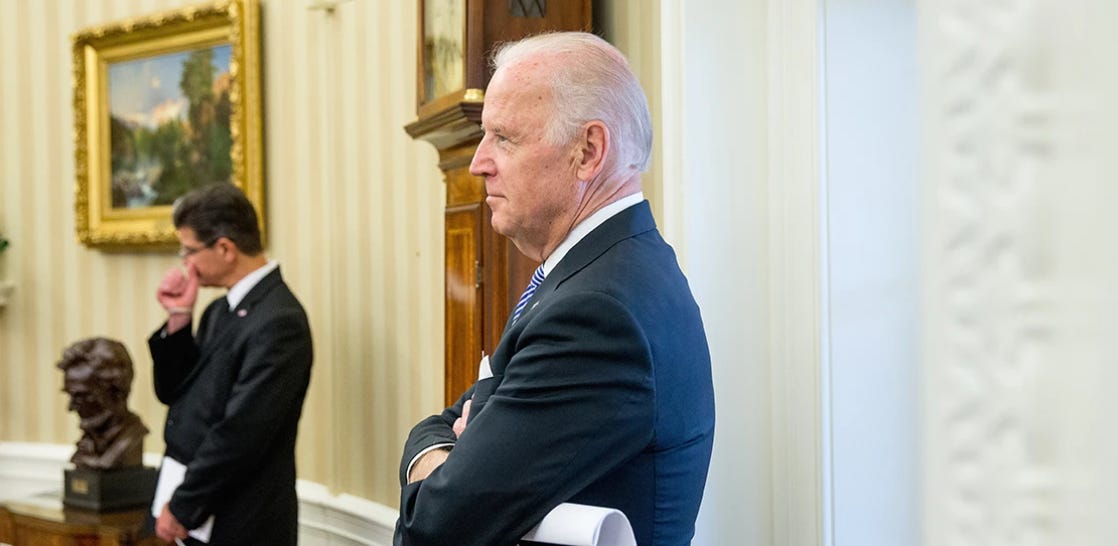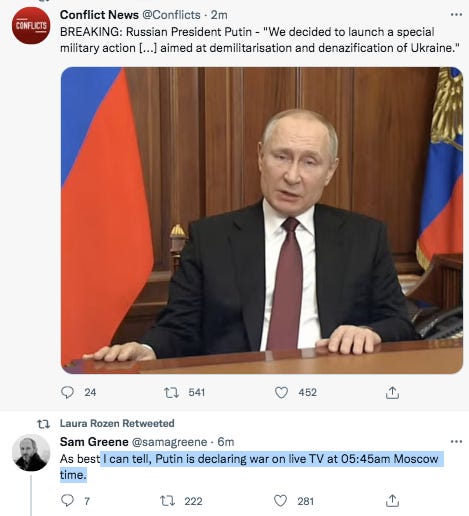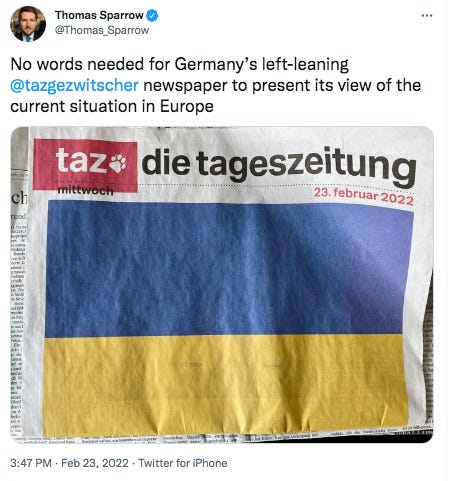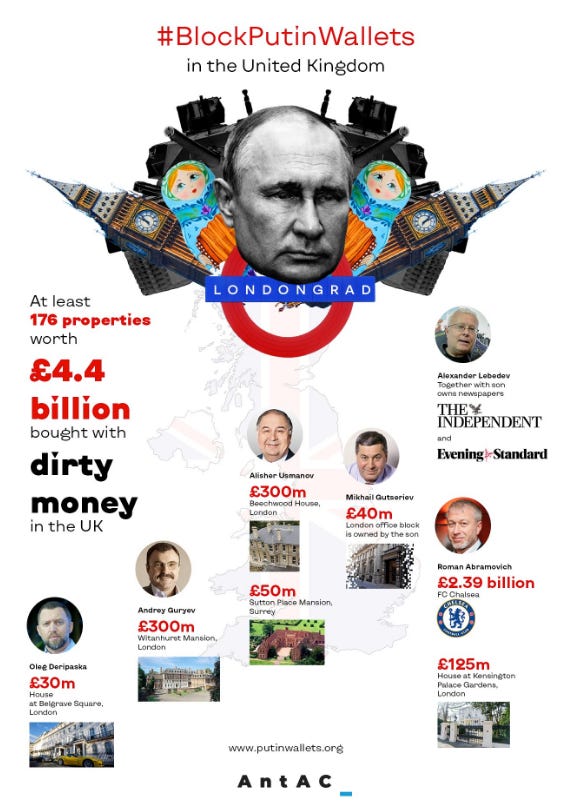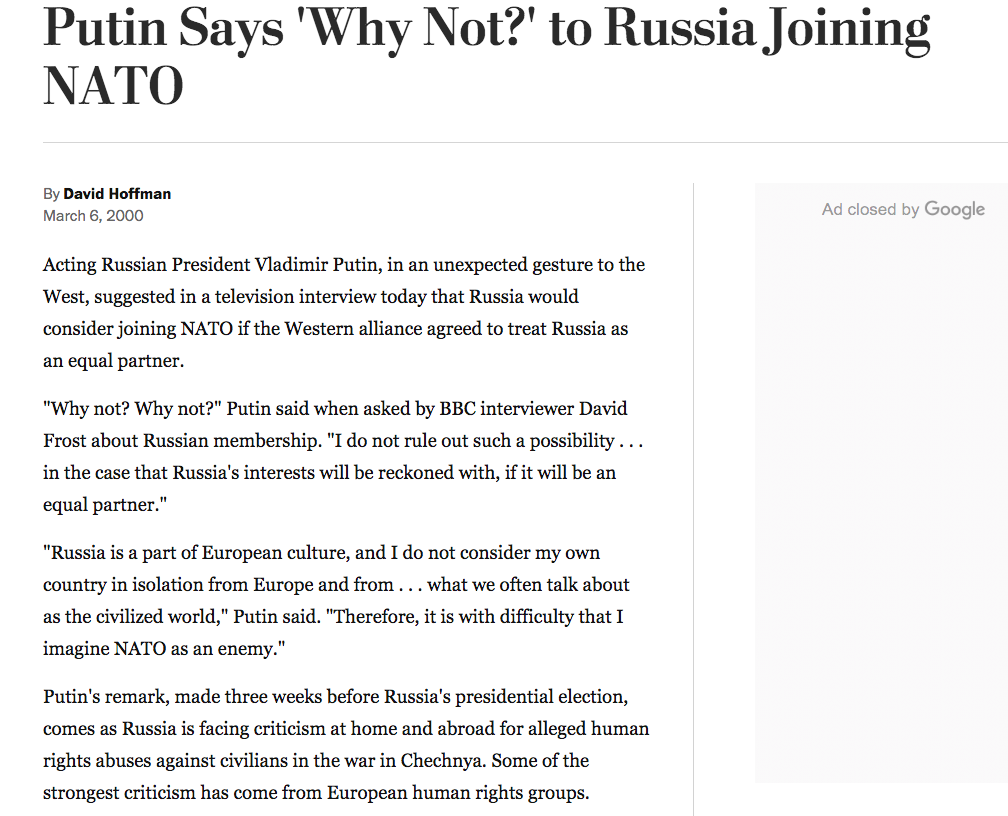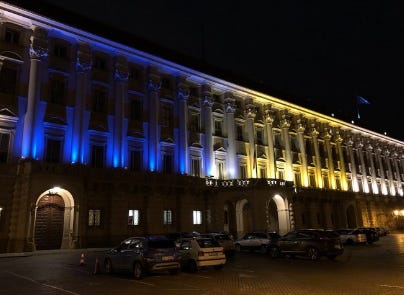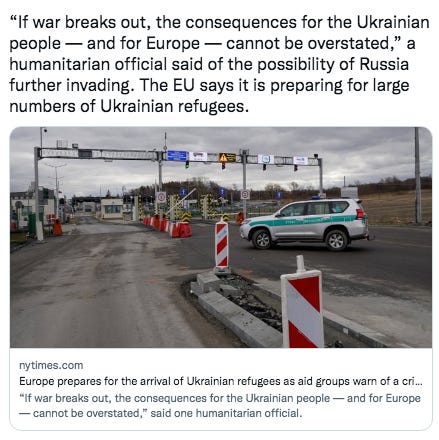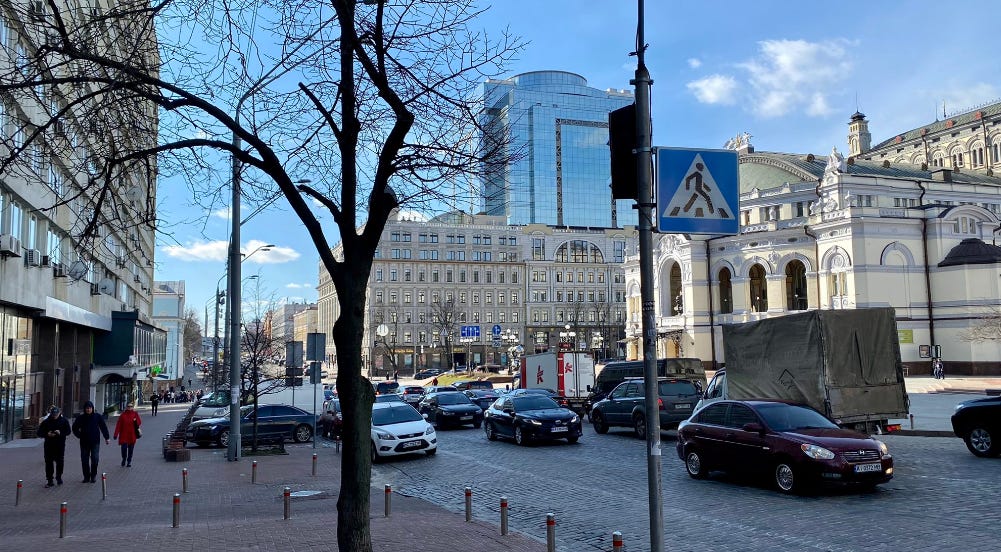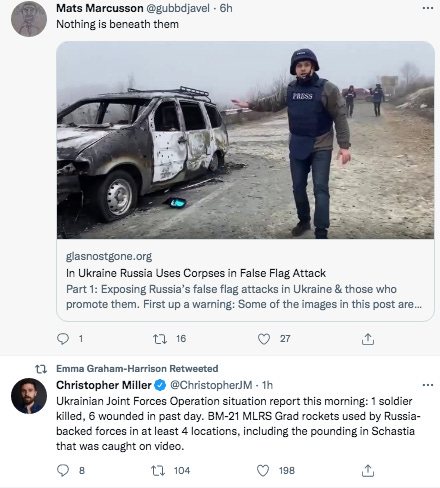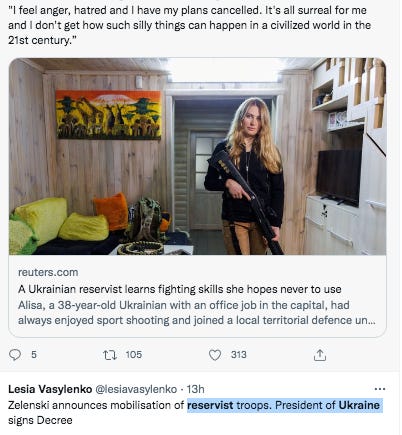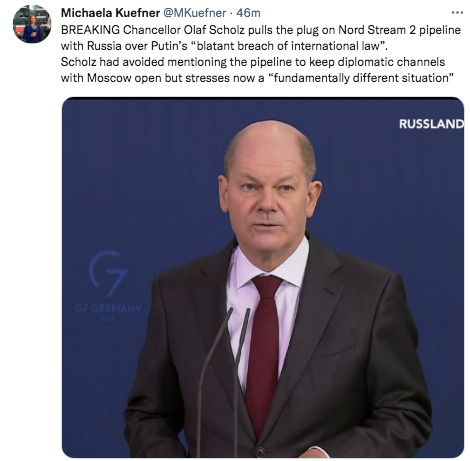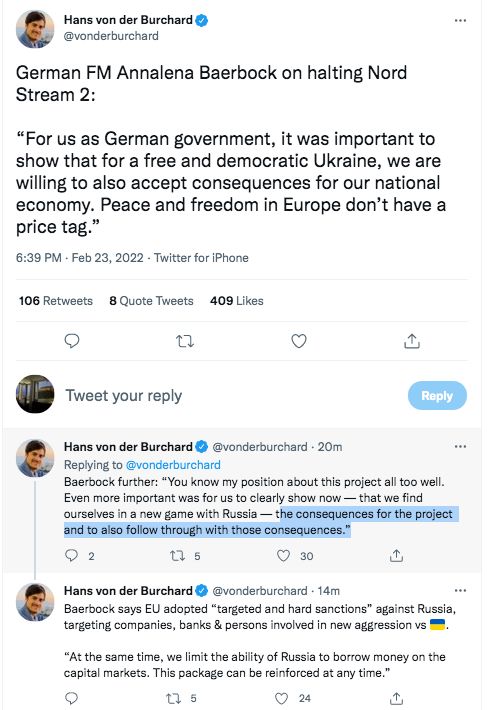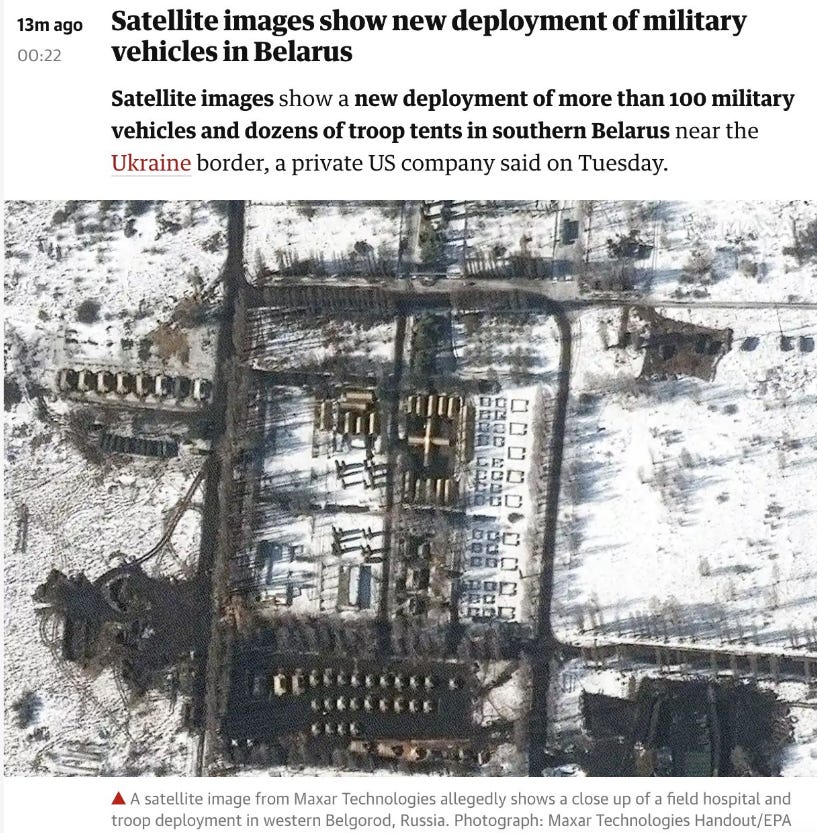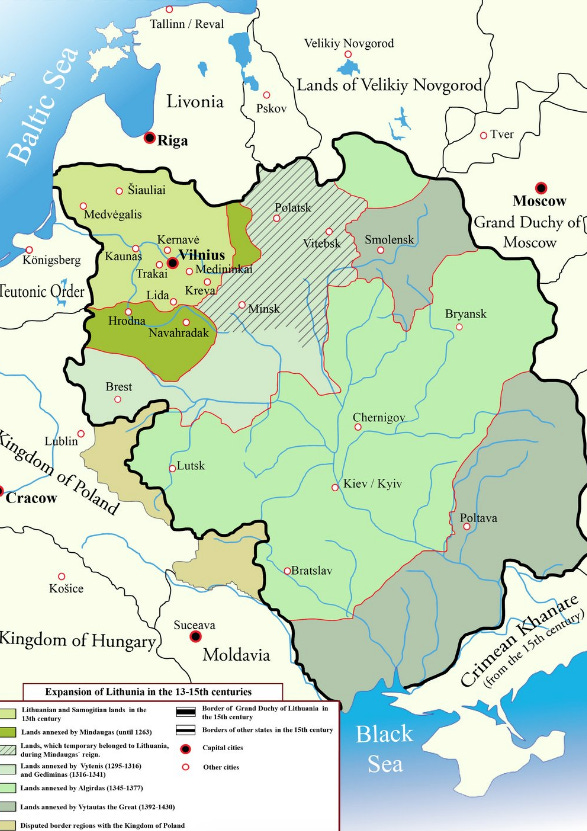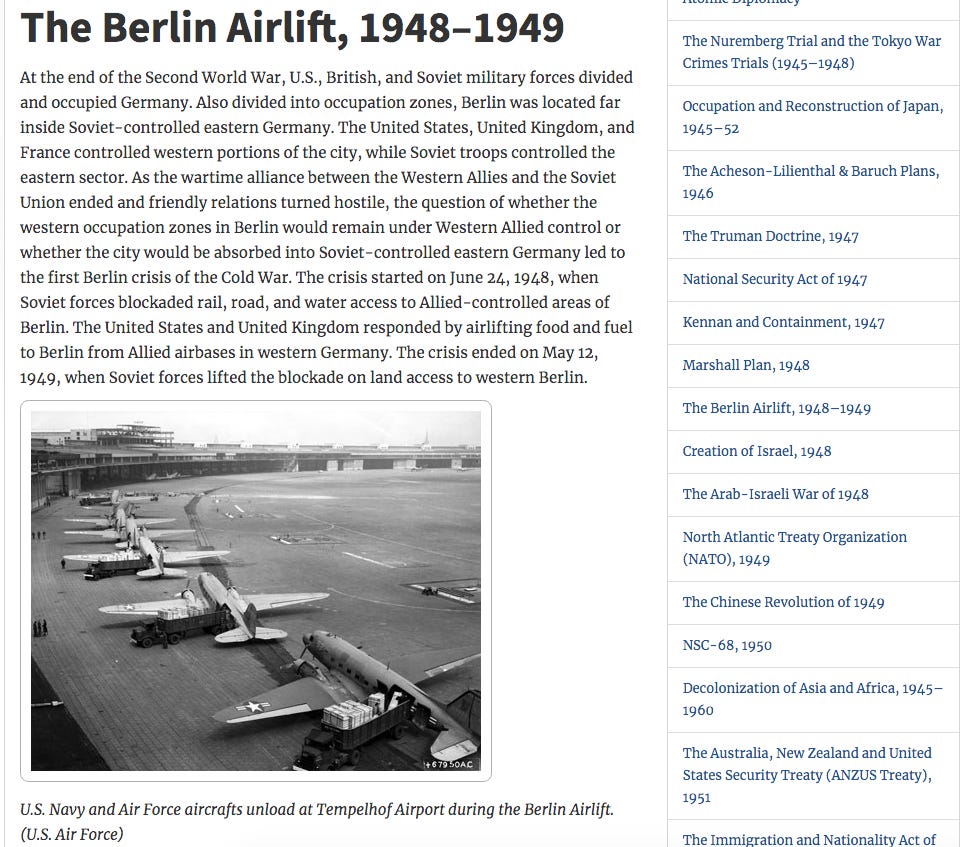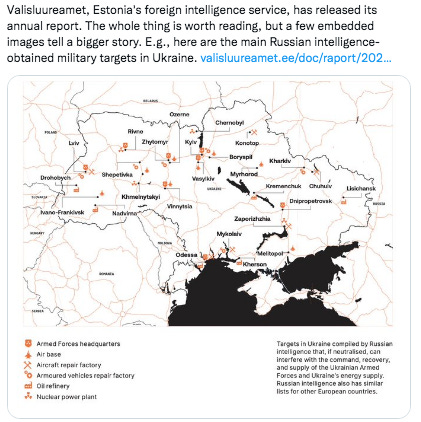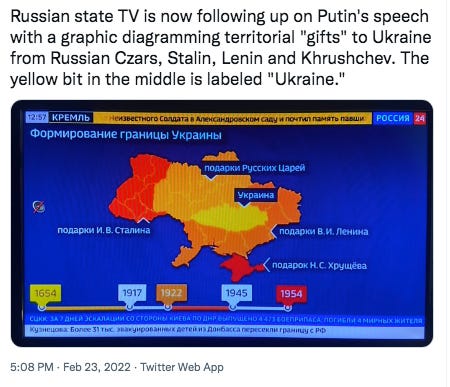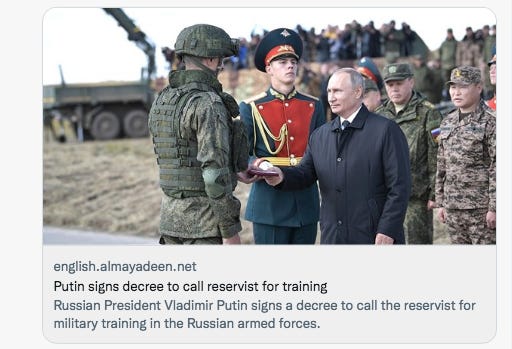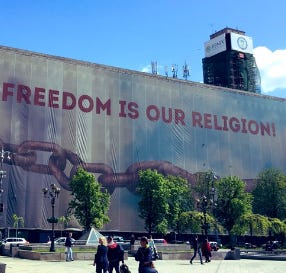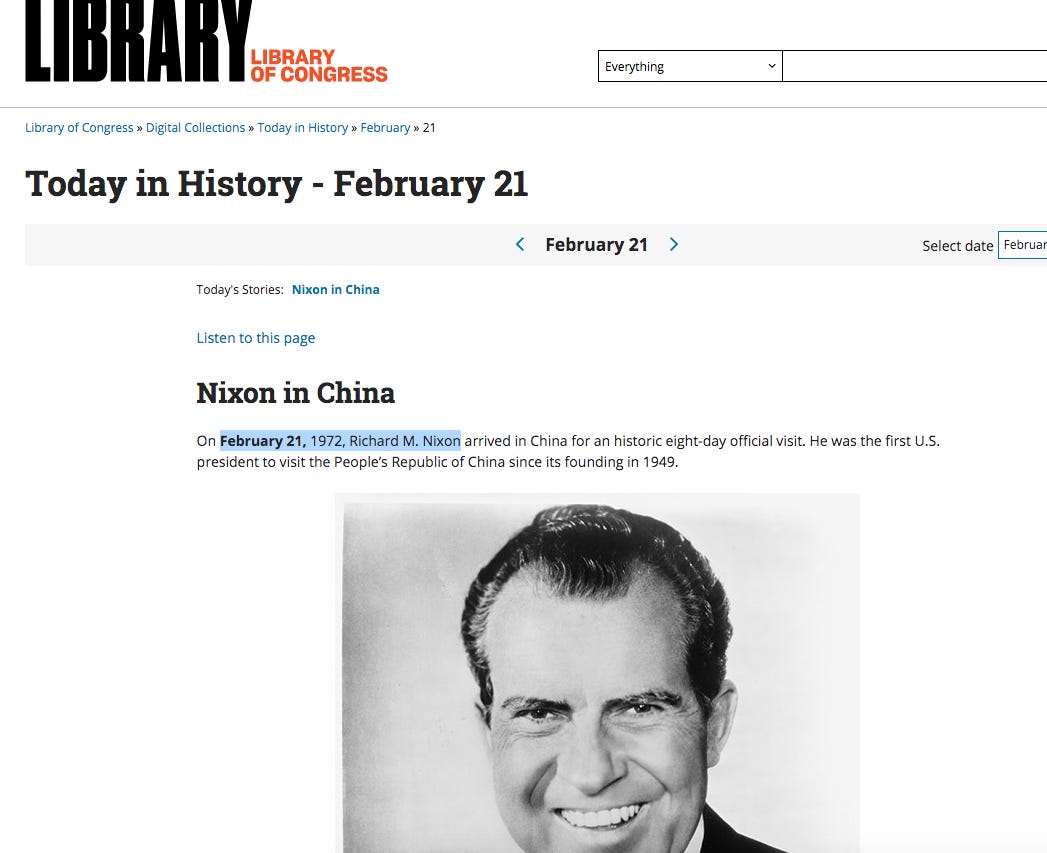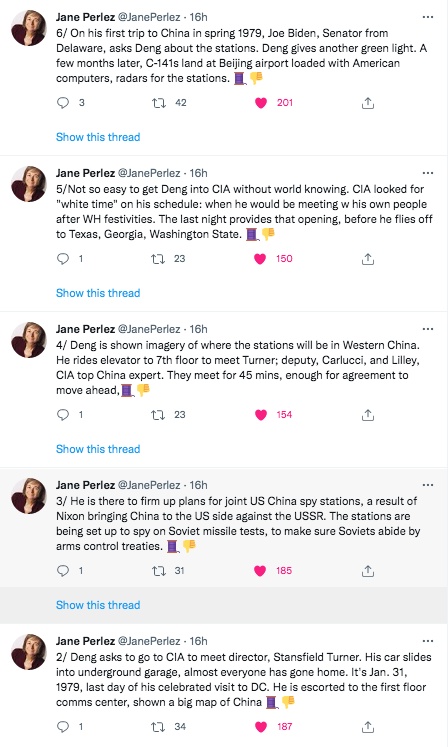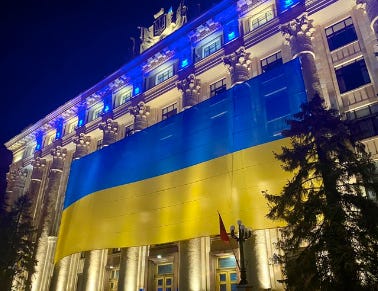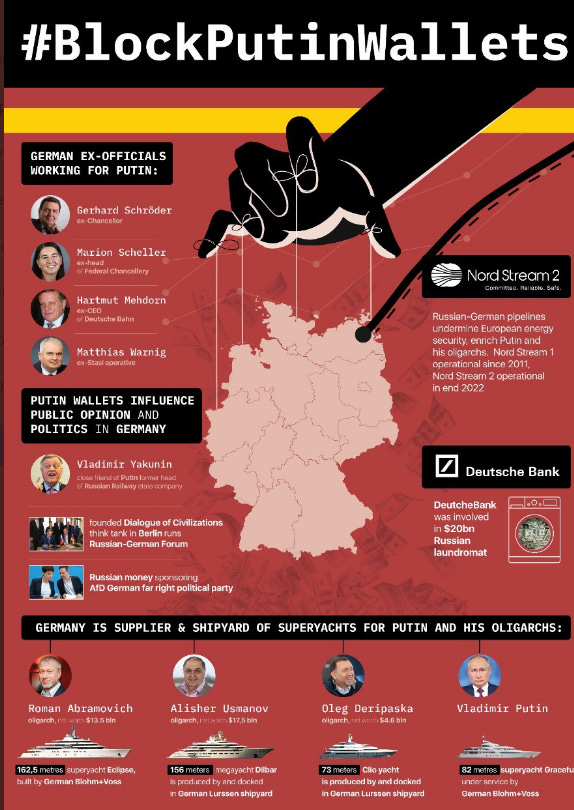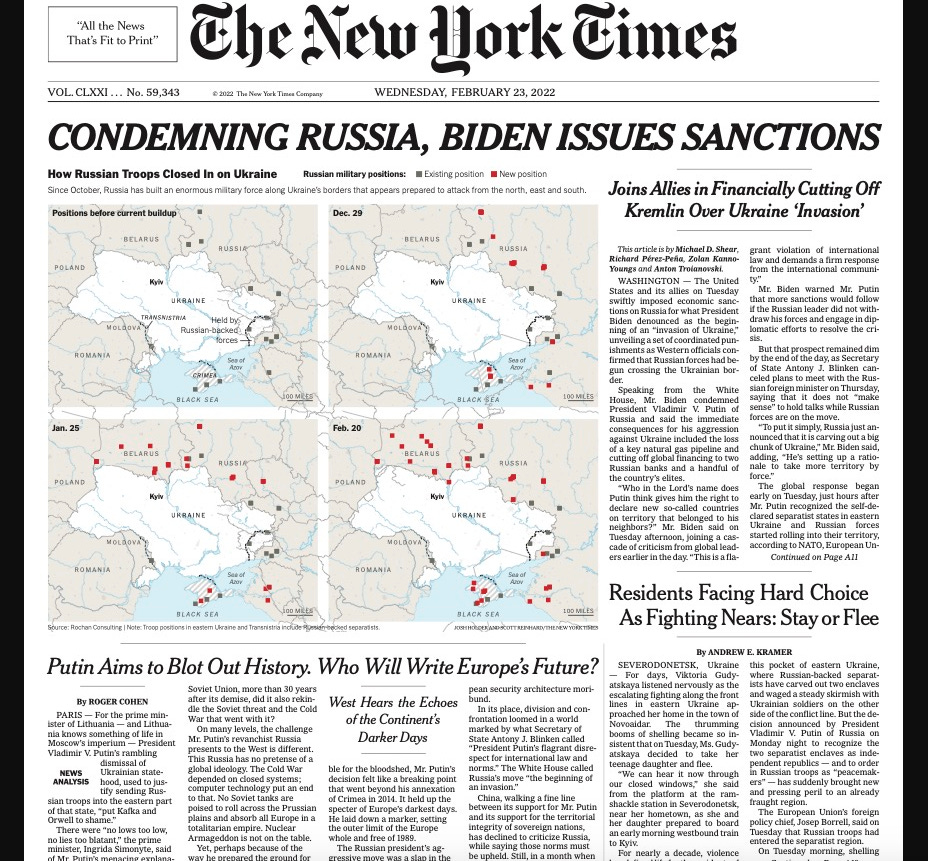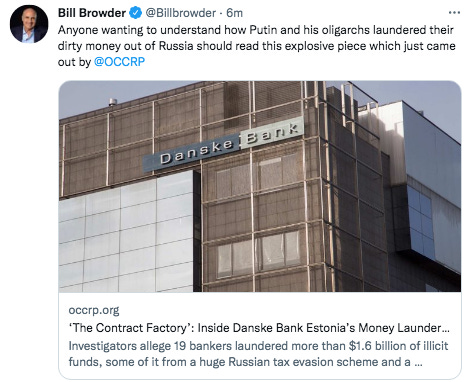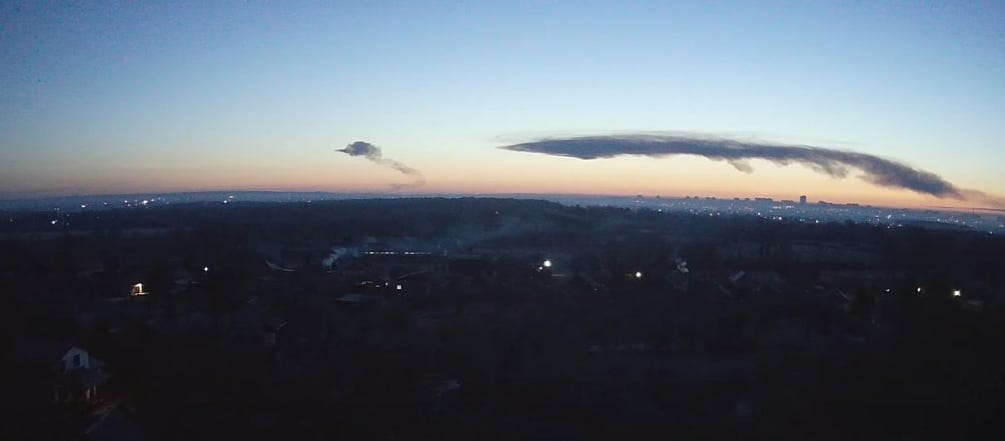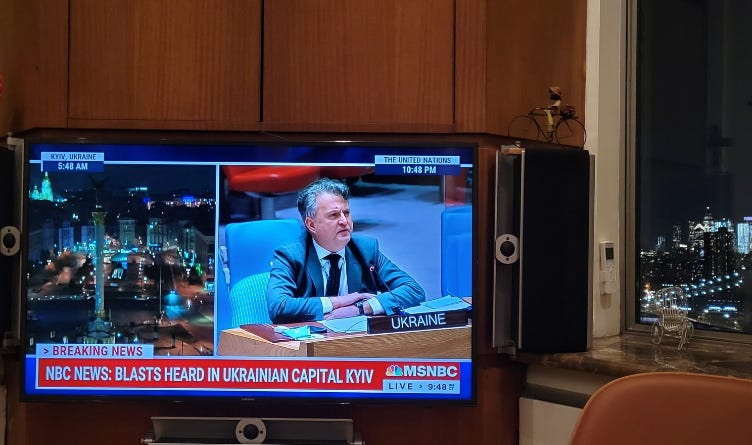When Medvedev (via twitter) immediately response (no longer certification Nord Stream 2, by Chancellor Germany Olaf Scholz) “...Europe will pay EUR2000 per cubic feet gas..”, this indicates that Russia has more options to sell gas to another (maybe China) with a more competitive price than Europe (especially Germany).
On another context, Russia even know 2 biggest gas deposit in the world is (split) between allied and enemy for US: Qatar, the close friend of US in Arab beside Israel (and even US have a biggest base in Arab soil, in Al Udeid) and long time enemy, the Iran. If really Scholz no longer wants Russia gas (and maybe another EU following Scholz decision), Europe (& U.S.) must make sure a new pipeline from Qatar to Europe, with high risk (geopolitical) must be solved about Syria, Turkiye, and entirely Serb soil before the pipeline is built. With arrogance, Medvedev might said “we (Russia) actually giving {Europe} a cheapest price, but no Thanks from you”
Medvedev highlighted…. actually Russia is not so dependent on Euro money (especially from Germany). Russia can rejoice in its economy without an entirely European Union, a biased view since 4 months ago since November 2021 Russia has the ability to invade Ukraine because of “Germany money” (money from selling gas). Russia (also) can rejoice entirely military after the 1991 collapse, Medvedev assumes, not because of money from Europeans but because of Russia 's capacity itself.
So, what is actually the Putin problem? NATO enlargement? European Union enlargement? Putin in 2000 even said “why not” for the idea of Russia joining NATO. After the Lisbon Treaty 2007 and enlargement of membership from eastern European (like Bulgaria, Romania), even (both) Putin and Medvedev were not bothered.
When Financial Crisis 2008 look easier or (part of) solved in 2010, Der Spiegel even published Op-Ed why Merkel must engaged Putin to joining NATO as soon as possible, amid moment solving of crisis (and Russia actually hit very big loss, not only entirely EU and US) and before Putin changed his mind to be more hawkish after invading Georgia (August 8th 2008). When Putin has forced the Russian budget to invade Georgia (2008) in the same moment of the Financial Crisis, actually Russia's budget is bleeding very disastrously, but not much media can well reportage “autocrat” model like Russia.
The Putin problem why invade Ukraine, actually: Democracy. No, not because Crimea is very strategic and has water access, also a pivot area for Russia and the West. The Putin fears simply about Democracy.
The west should apply some sanctions now but keep its powder dry for the moment Russia starts moving beyond the line of contact. At that moment the bulk of the sanctions need to be applied immediately; and this needs to be clearly communicated in advance: strengthening democracy in another CIS membership. We know now that Putin is not interested in negotiating a new order of security with Europe; he will unilaterally try to implement the order of security that he wants: autocracy like him in around the Russia territory. When Ukraine (with Zelensky) shows democracy is living, Putin really fear.
Exactly, for the Soviet Union in 1987-1990 (not: Russia) the problem was the reemergence of an East German (gradually spring of) democracy because influence from West Germany, to be a Moskva threat, and Bush sr convinced Gorbatchev that the answer to this problem was NATO. The Berlin Wall really fall because “the dam really broke”, democracy is growing in East (Germany).
Putin's goal is not just to derail Ukraine's NATO bid (which is a long term perspective at best anyway), and his goal is not to solve the conflict in Donbas in a way compatible with Ukraine's territorial sovereignty. Putin's goal is to bring Ukraine back under Moscow's contro, “puppet” leader controlled by Moskva, an autocracy. Not a Democrat profile like Zelensky. Putin wants to decide about who runs Ukraine. This is incompatible with Ukraine's sovereignty and independence. Putin wants a corrupt President but can be controlled by the Kremlin, like Russia successfully (even amid collapse 1991) in Kazakhstan, Uzbekistan, Kyrgyzstan, Azerbaijan. In Putin's mind, successful democracy by Zelensky as a President of Ukraine is a “dangerous” sentinel”.
Putin stopped his first attempt to reach that goal in 2014-2015 because the price became too high: the proxy forces in Donbas were too weak so that regular Russian troops had to be dispatched; Ukraine was stronger than expected; and the West agreed on massive sanctions. And a surprising decision by Merkel (since 2013): Germany agree “open hand” 1,5-1,7 million refugees from several Moslem countries especially from Syria, then battleground in Syria “more freely but also more dangerously” for each other, both US and Russia.
Putin accepted the deal offered by Merkel (Minsk II) because he thought that it provided Russia a path to the domination of Ukraine by giving the proxies in Donbas a decisive say over the government, in other words, allow Moscow to manipulate the government at will Ukraine would not have the ability and will to resist to Russian pressure over the years; then (in Putin’s mind) the West would lose interest quickly and leave Ukraine facing Russia alone (like Georgia in 2008). Yet those assumptions turned out to be wrong.
Instead of falling into Russia's lap, Ukraine stabilized itself and became stronger and more independent, also with Western support. Maybe the crucial reason why the West did not lose interest in Ukraine 2014-2015 is Obama. Obama, in final year, may have predicted that the US will fall to Trump (than to elect Hillary), make sure to stabilize and democratize Ukraine, then, Zelensky (after Obama finished his presidency) won an election, very democratized. Plan A by Putin has failed, so Putin moved to plan B, back to using his huge military advantage. And on Russia's side, actually Syria's front bleeds Moskva more than Putin predicted, however Assad is successful still to be President and “Putin’s puppet” in Arab soil.
While in 2014-2015, Putin played the bystander, the concerned neighbor, denying (against plenty of evidence) to be the party to the conflict, even the aggressor -- this time he had no chance other than laying his (only) cards on the table, with a massive military build-up. This military-build up gives Putin a number of options. He can either attack Ukraine openly or use the threat of war to try to extract concessions or just hide-a-seek strategy, deterrent anytime Putin want. While the build-up has its own dynamic, Putin is in a position to stop it anytime.
Putin now does everything to look determined -- to make sure that everybody understands that open, large-scale war a real option for him, so that the West won't think this is just a bluff. Yet the risk of war is immense, and the options are bad for Putin. If he chooses to do something small, he may gain a bit of territory (in addition to the quasi-annexed Donbas), but not control of Ukraine; he would get sanctions and a more determined Ukraine. So Putin tries to whatever cost invade Kyiv control.
(Kyiv in the morning, Feb 23th 2022)
If he chooses to do something big, starting a major conflict, he would set in motion a dynamic that he can't control and that could undermine his position at home. open war of aggression would not only cut Russia off from the West, it would also destroy the image Putin has carefully built over many years -- of a responsible stakeholder, guardian of the UN system (Russian interpretation), and partner of a China that emphasizes peace. China, at least via Ambassador in the UN, failed to choose firmly option (firm pro, or firm cons) to Russia.
Putin has every interest in not choosing the military option. He must hope that he can get what he wants by using pressure. Yet so far, pressure is not working. Ukraine is determined to resist, and the West has united in supporting Ukraine with all means short of war. Putin's current tactics is to move ahead, pause and talk, move ahead. He tries to get from the West the promise to end support for Ukraine on all levels, starting with the Nato option and the Normandy talks -- but certainly not ending there (2014 he went to war over EU ties).
Yet so far the West stands by Ukraine, is not selling it out. Yes to talks but no to abandoning Ukraine's sovereignty, its existence as an independent state -- this is the joint position of Ukraine and the West. For the West as for Putin, this is about Ukraine, but about Ukraine as a centerpiece of the post-Soviet order. Putin wants to revise that order and turn the configuration of independent states into something like the Soviet empire, with Ukraine and Belarus as major pillars.
The West understands that the outcome of 1989-1991 is at risk - an order of sovereign states - and that a Russia that would get Ukraine under its control would not stop there; it would feel emboldened and further undermine the stability of Eastern Europe and Central Europe. Given the incompatibility of Putin's aims and the interests of Ukraine and the West, it's hard to see how this crisis can be ended through diplomacy. The best bet for the West remains to raise the price in order to discourage Moscow from using force.
Putin is driving that train, unless we can get the initiative to stop 190k-210k Russian troops. The currently deployed Russian land and naval forces are like a boa constrictor around Ukraine, choking its economy and further threatening its sovereignty. Kremlin's aim is to make Ukraine a failed state, which they believe they can achieve by applying constant pressure and isolating UKR from the Black Sea, without actually launching a new offensive. Instead of being a failed state, Russia is currently facing very significant sanctions. When a lot cynical about Nord Stream 2-(too dependent on energy needs) Germany, then Scholz really changed his stance and decided to no longer certify Nord Stream 2, this a very high bar sanction for another EU to reduplicate.
Putin has multiple options, including a new invasion, not surprised if 3 days from now 260k Russian troops are around the Ukraine border. and there are no real signs of de-escalation from the Kremlin apart from vague commitments about minor troop withdrawals. massive assault isn't necessary to achieve the Kremlin's strategic aims. More likely is a continuation/expansion of the current conflict, particularly along the coasts near Odessa and the Sea of Azov, the same pattern Russia has employed since (August 8th) 2008 in Georgia.
Belarus is also a key part of Russia's scheme. President Lukashenko will be gone and replaced this summer. This is the next step in completing the Union State, which also has long-term implications for the very vulnerable Suwałki Corridor. The Biden administration deserves credit for bringing Allies together. All of whom continue to reject the Kremlin's demands. But we in the West still can't fathom a large-scale war in Europe in the 21st century.
We should be prepared to escalate horizontally including giving Ukraine the capability to strike the Kerch Bridge and or illegal base at Sevastopol, challenge Russia in Black Sea international waters and airspace, and be prepared to quarantine Russia's base at Tartus. Foremost, Putin has recognized the independence of Donetsk and Luhansk, then
Transnistrian (part of Romania region) leaders (Ana Catauta) are in Moscow, asking for the recognition of Transnistria independence. So, Putin will immediately elect some “puppet” in Donetsk, Luhansk, and Transnistrian.
But geographically, Romania borders Moldova, Ukraine and Georgia (over the Black Sea). All these countries are occupied in some part by Russia. None of them are in NATO. Romania is not occupied by Russia. And it is in NATO. Therefore, NATO works. West should be doing everything possible to help Ukraine's economy and defense, something on the scale of the Berlin Airlift (June 1948-May 1949) but capabilities including IAMD, cyber protection, counter-fire radar, anti-tank, Stinger and Avenger, anti-ship, anti-nuclear (a lot Nuclear silo Soviet era in Ukraine soil).
(Maybe) a good surprise for the West, are greatest piece of leverage is Turkiye’s ability to close the Straits to Russian ships under the Montreux Convention. We need a significant diplomatic effort with Ankara beginning with assurances that Turkiye won't be left alone if the Kremlin retaliates. We really know Turkiye too often flip-flop with the West, but Erdogan decision to condemned Russia is really surprising, and good.
We need to make sure Russia doesn't call our bluff on sanctions... we could pre-emptively freeze selected Russian assets and consider a “Ukrainian War Tax” to insulate our own economies and show our commitment. We should build off-ramps for Putin while staying cleareyed about the nature of diplomacy with the Kremlin, including reestablishing mutual special military observer missions and doubling down on exercise transparency.
A public statement by Allies guaranteeing Russia's internationally recognized borders sounds ludicrous but could help counter the false narrative that Russia is threatened by NATO. This is about more than Ukraine, but also our collective security and stability. A failure of deterrence in the Black Sea will also send a signal of weakness to China (mortgage problem, covid surge, etc) and we'll need Allies to deter great power war.
Among more liberal/pro-Western minded, the predominant feeling Monday night (Russia starting invade Ukraine via Luhansk and Donetsk) was bewilderment - with folks thinking until the last moment that "he's not gonna go there" - mixed with a deepening worry about the future trajectory of the country: domestic & its foreign policy. The more hawkish felt vindicated by the building of momentum up to Monday (coercive diplomacy needed as a gamble toward rectifying past injustices) but were equally caught by surprise by Putin's speech (tone & substance). And seem to lack a clear sense of where all this will end.
Radicalization in Russian Mind (not only Putin)
Trying to find explanations, many were hard-pressed. Some suggested that Putin calculated - as he indeed stated before - that Russia will be sanctioned, called "the bad guy", with its interests disregarded by the West - maybe Putin predicted it, and still agreed paying this consequences because Putin was still “winning on Ukraine”. Amid a variety of views on what precisely will transpire next, there's consensus that we're far from the end.
Either rapid escalation soon, or incremental "tightening the screws" on Ukraine - until, some say, he finally forces the West to "become serious" about talks. regarding December security guarantee demands. If so, that could be a dangerous misreading of how Western response is shaping up.
As a IR student living/starting to deepen learning at the same moment “Lisbon treaty” (enlargement of EU membership), I have seen scores on this platform characterize Monday's events as an inflection point in our relations with Moscow. True, but for many of us long-time Russia-watchers, it's been a rolling inflection point. And I believe the ball is still very much rolling. I still don't think that the majority of Russians buy all this stuff. The reactions I cited are from a jingoistic group that are laser-focused on Ukraine and Russian prowess. The majority don't want to see Kyiv bombed. The question is, whether Putin cares about this or not. Or Siloviki around Putin really made him too blind about the West position.
Probably with the recognition of DNR and LNR, an Abkhazia and N. Ossetia scenario is coming into play. According to the Dec 2021 Levada poll only 4% of Russians blame Putin for the Ukrainian crisis. Also, Pew Research from 2017: In Russia, 58% of adults see Stalin’s historical role in either a “very” or “mostly” positive light. Putin more recent dislike of Ukraine probably started around the Orange revolution in Ukraine - hence the experiments with the Nashi movement, first deployment of the St. George ribbon - things that come in handy in 2014. Obama and the West said “democratization”. Orange revolution (in Putin’s mind) was framed as a Western plot to overthrow a Russia-friendly regime, as "a crowbar" to get to Russia and to change the regime in Moscow.
Putin is getting scared, especially given that at that point in time Sevastopol was leased from Ukraine and Russia still does not have any warm ports to host its Navy. Crimea takeovers in case of Russia unfriendly Ukr gov were in the works for a while. Russian intervention in Crimea and beyond was legitimised as an attempt to save Russian-speakers from physical extermination, just like in World War II, and Ukrainians were represented as Nazis. A lot of people in Russia believed that. So, the West must anticipate (actually) not only Putin’s mind, but also the mind of the Russian people.
Hence the use of St-George's ribbon: to create a visual continuity with the Great Patriotic War (WW2 in Russian) and to frame anybody who opposed pro-Kremlin Ukraine policy as a fascist who is spitting on their grandparents' graves. The fact that Putin (and a lot of Russians) don't believe in Ukrainian statehood is widespread. Just compare these quotes with Putin Monday’s speech, with another statement by hawkish in Russian.
Still, we know from history that a country like Ukraine in its present borders, never existed. Vladimir Lenin with his beautiful pencil and national policies , together with Stalin , in fact, created a state within its current borders’ (Pervyi Kanal, 26 February 2014). "Ukraine doesn’t exist. This puppet state today, failed state, and the entire responsibility for that currently lies with the United States" (Pervyi Kanal, 18 July 2014). "The United States invested $ 5 billion in “Ukraine's aspiration for democracy”. But the main prize is not Ukraine, it’s Moscow, Maidan on the Red Square "(Pervyi Kanal, 9 March, 2015).
After 2014-2015 (invasion of Crimea) things have calmed down both on mainstream and social media. There were still occasional flares - still remember Antimaidan and Girkin pages celebrating the shooting down of MH17 which they thought was a Ukrainian plane. Russian mainstream media started showing again pretty disturbing footage from Donbas where they insisted that Ukrainian forces were killings children.
I was hoping that it would not come to this. Russians were getting desensitised with Ukraine stuff and not buying the fact that a fascist state would elect a Jewish Russian-speaking President. Before Zelensky's election, Russian social media were sure that Poroshenko would win. In December 2021 it got worse again. More people tuned into Putin's December press conference expecting a war announcement. Nothing happened: before New Year break it was unlikely. February, however, with the Crimea anniversary and fatherland defender's day- better optics. I still don't think that the majority of Russians buy all this stuff. The reactions I cited are from a jingoistic group that are laser-focused on Ukraine and Russian prowess. The majority don't want to see Kyiv bombed. The question is, whether Putin cares about this or not.
If Democracy Wins Over Russia, What About China?
Debates over the US-China-Russia triangle are likely to intensify in the coming weeks. Russia’s aggression toward Ukraine will provide the spark, but lingering US frustration at the current strategic geometry – 50 years after Nixon’s visit to China – will add fuel to debate. February 21th 2022 is the 50th year of “Ping Pong Diplomacy”, Nixon’s initiative to open hand diplomacy with China rather than Taiwan.
Fixating on US-China-Russia triangle may be the wrong lens for examining events. If there is war in Ukraine, and if China actively attempts to shield Russia from global condemnation, then China may spur a self-harming solidification of blocs. If Russia starts war and PRC allows itself to become seen as a witting enabler, Beijing risks finding itself aligned with weakest other major power and hastening the process of hedging by other key actors (EU, UK, India, Japan, Australia, etc.). Some may argue Beijing already made this choice. I would caution against assuming such pre-destiny. It's not in US interest for China to conclude it has no alternative but to tether itself fully to Russia. China-Russia relations now are unnaturally close by historic standards. And China today is richer 100x than China before Tiananmen.
Now is the time for sharpening Beijing’s choices. This does not mean concessions or softening approach to PRC. Rather, it requires Beijing seeing a path remaining open for less hostile relations with the West, and significant risks for being linked to Russia’s recklessness. The goal would not be to seek to compel Beijing to break from Moscow. That is not happening. It would be to help Beijing reach its own judgment that its interests require it to begin a gradual, steady reorientation in the wake of a Russian invasion of Ukraine.
Beijing needs to be helped toward realizing that going all-in on China-Russia relationship carries more risks than benefits. This may require efforts by other parties to signal to Beijing that a path remains open for China’s rise – the rest of the world isn't determined to obstruct. It may also require credibly warning China that if it locks into order-challenging partnership with Russia, its relations with the West would be more strained. Calls also would grow louder in the US to view Taiwan as a strategic asset for dealing with an antagonistic China.
We may yet end up with China taking a head-down, all-in approach with Russia, but if we do, I hope it is because all efforts to forestall it were exhausted. Crises also present opportunities. US diplomacy should explore whether they can be realized. Xi isn’t going to change Putin’s calculus on Ukraine. The test will be how Beijing responds to events there. In the coming weeks, we will likely learn a lot about U.S.-China relations, and China’s view of its role in the world, for the coming years.
Democracy Must Go On, Whatever Putin Decision
Declining democracy increases public support but partisans respond distinctly based on views of citizenship. Many differences in mass & elite opinions on foreign policy are due to basic compositional demographic differences in samples, rather than elite access to information. In the first impeachment, Ukraine was treated by the US press as obscure. But the scandal was partially about the holding up of US funding for Ukraine to face the Russian threat. Will it (& perhaps 2016 election interference) now be covered differently in history, as part of a longer trajectory?
Putin’s focus on Minsk 2 was on the part that would require Ukraine to conduct a constitutional reform that would give the separatist region a special status that would allow it to veto any foreign and defense policy decisions. Since separatists are just Russian puppets and their leaders are in fact Russian citizens ( the current one is even a member of Putin’s party ), this would essentially give the Russian government a direct political control over Ukraine, essentially eliminating its sovereignty.
You can imagine the kind of Justice that would be practiced by such judges and courts.. there was 0 chance that Ukraine was going to accede to giving up its sovereignty, as it has had 0 political and civic support for obvious reasons. The confidence game put on by Putin that involved the massive show of force aimed at compelling Ukraine or compelling the west to force Ukraine to abandon its sovereignty via this backdoor maneuver. Putin also counted on destabilizing Ukraine politically by keeping the threats of force, potentially leading to the fall of the government and a divided country that would lead to a friendlier regime that he could either control or even potentially install.
Putin kept escalating because inertia took over and because he assumed that credible threats of war ( culminating with nuclear drills over the weekend ) would scare soft Europeans who don’t want war and who are visiting the Kremlin like never before. Meanwhile, the UK, Canada, the US and a number of other NATO countries have been sending plane loads of weapons to Ukraine for weeks, on some days up to a dozen planes - to either help deter Putin or help Ukraine army defend the country more effectively. In the end, Putin’s confidence game has failed, since he never planned on the actual war which would be costly in resources and lives and very risky since given Ukraine’s resolve he wouldn’t achieve political aims even by military means, he doesn’t have enough troops.
Ukraine is now more united,more anti-Russia and on a faster path of spinning out of Kremlin’s “sphere of influence”. Why did Putin go for this option ? Well, faced with western and Ukraine’s resolve in response to his ultimatums and what he thought were credible threats of force, but unwilling to make good on these threats ( high five to the boys at Langley for confronting his bluff in the information space ) he also needed to save face and show a win for all his Herculean confidence efforts.
The win that he needed for this not so much to show to his domestic audience but to show to his own little circle of strongmen that constitute his inner circle. because coming out of this as a loser in their eyes would basically dramatically shorten his reign. This is why the West must be brave to democratize Russia, and even with war (if needed), because the West finally knew Putin’s behavior too aggressive.
While this is a risk, it doesn’t seem highly likely since it would create a risk of a big war for Putin that he was trying to avoid, since expanding territories controlled by “sovereign republics” doesn’t score anything for Putin politically while risking far harsher sanctions (Nord Stream 2 no longer certification; or another very bleeding sanction on Russia’s wallet/Putin’s wallet) and bad optics of dead civilians that allegedly he wants to protect, etc.. This is probably a good time for him to consolidate and absorb mild sanctions from the west while doing his best to shift attention from this issue for now.
The advantage of the West is not only democratization. Putin is deadly afraid of COVID partly because he has grown more paranoid, partly because he might be immune compromised based on reports of some severe illness he might have had in 2019 ( unconfirmed ), and also because he is not vaccinated and he has seen the severe death toll of the unvaxxed in Russia. I am pretty confident that he is not vaccinated because he is too paranoid to allow himself to be injected with anything.
Because his inner circle/Siloviki likely narrowed to the hard liners, this also means that his sources of information and advice have narrowed and he likely only receives advice and info that he wants to see and/or that his entourage wants him to see. Putin probably miscalculated in his assumptions that his confidence van would succeed because they were based on information that wasn’t representative of reality. Putin came across extremely angry, but mainly because he has lost and he had to resort to the option in his arsenal that he wasn’t really planning on using.
Putin played a high confidence game to compel the west to new world order and to compel Ukraine to lose sovereignty and lose. There won’t be a full-scale war (though limited confrontation in the East Ukraine is still very much on the table). But there also won’t be a big deescalation, though I think we will see some troop drawdown shortly since he can’t keep the troops idle for too long living in tents in the middle of the Russian winter end. If Putin was serious about a full-scale invasion he wouldn’t need the theater of recognizing the separatist “republics” first; he also would have had the state prepare the nation for war through months-long war propaganda - which wasn’t happening.
The Biden admin has support from three Asian partners for severe sanctions and export controls against Russia. Singapore, Japan, and Taiwan have signed on for restrictive export controls on tech-starved Russia over a further Ukraine invasion. This would use the newly-made Foreign Direct Product Rule that US officials recently used to target Huawei.
It could hit much of Russia’s economy—blocking Russia from getting tech critical to oil and gas, maritime, defense, and civil aviation & even cars & consumer electronics. The Biden administration's success in multilateralizing export controls is impressive. The flurry of diplomacy in recent months has clearly borne fruit. These measures stand to substantially degrade Russia's technological capacity in the years to come, whatever spectacular China technology tries to help Russia.
Getting major Asian powers onboard for the international community’s sanctions regime is a big diplomatic coup for Biden. While certainly fueled by concerns over Chinese irredentism, this is big for stemming the flow of high-tech components to Russia. Smart cost to impose on the Russian, combined with the economic ones being proposed, what you're looking at is a Russia that will go backwards in economic development.
A good add-on policy would be to provide priority immigration for Russians with STEM degrees, and maybe democracy spirit in heart and mind.
Biden administration is prepared to use this tool against other state-owned Russian banks, including even larger ones, if conditions warrant it. Very significant, adn simultaneously sanction from the West, was remarkably well coordinated with the EU. To many observers' surprise, the EU roughly matched the US actions, including imposing sanctions on Russian sovereign debt.
The message to Putin (and even Xi Jinping)? The US and EU are much better aligned than skeptics have claimed. If Putin intensifies aggression, I expect today's action is just the tip of the iceberg. It signals what's to come (more sanctions on bigger Russian banks) & demonstrates impressive unity between the US & EU. Here's hoping Russia backs down and no more sanctions are needed.
The nature of sanctions has evolved. Financial sanctions have traditionally been the strongest weapon in the U.S. arsenal (and will likely continue to be). As people recognize the importance of technology and resource constraints, export controls and the Department of Commerce have become central. The US anti-China campaign and its semiconductor policies, e.g. efforts against Huawei, are key precedents. After US vs Huawei, a lot of countries decided to (proposals from) “Not Huawei” to build 5G infrastructure.
The 2014 Russia sanctions actually pioneered this approach, by targeting Russia’s energy tech. acquisition to blunt future production. This report shows how US sanctions meant to cripple production. Now the US wants to double down on this method. With restrictions on semis and coordination with US partners worldwide. If Germany even so brave (finally) to halt Nord Stream 2, no wonder a lot of cooperation (in technology) between Russia and Germany will be postponed. These developments have made discussions about humanitarian impact and impact on US consumers are now unavoidable (more so, I'd argue, than in the past). In a departure, Pres. Biden warned they could hurt the US economy.
Henry Farrell and Abraham Newman outlined a new way of thinking about sanctions. Their weaponized interdependence framework has busted stories about globalization leading to the dispersal of power in the international system. Since 2014 (Russia invasion to Crimea) we have a deeper understanding of global financial system workings. Whether through Tooze’s writing, BIS work, and COVID response, there's a deeper view of the interconnection between US coercive moves and traditional US macro moves. Whether by shaping rates moves, monitoring Russian reserves in NY Fed (as it did in 2014), or providing liquidity and support if markets move, the Fed can't help but be involved whenever a crisis like this happens.
Yes, since January 2022, Russia (currently) have a biggest ever surplus (even compared than Soviet era), and Kremlin opted to accumulation (buying) too much gold, prepare impact of sanction. But no one in the Kremlin can denied, The 2014 Russia sanctions were a major breakthrough: they heralded the arrival of refined “sectoral” sanctions. We may see a similar evolution now, as policymakers apply the lessons of the past decade. The West must “maximize” whatever advantage to make sure democracy liberalizes Russia. Whatever cost.
(skies in Kyiv on 5.51 A.M. Kyiv Time, after several missile attack from Russia)
(Ukrainian Ambassador is addressing the UN Security Council, attacking his Russian counterpart.)




